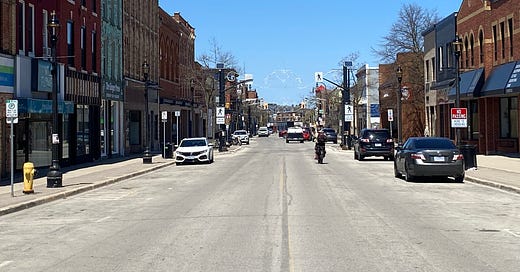Board Seeks Public Input Before Weighing in on Changes to Owen Sound's Short-Term Rental Rules
Owen Sound’s River District Board has delayed feedback on proposed short-term rental by-law changes, including lifting downtown restrictions and increasing the rental cap from 180 to 240 days/year.

Owen Sound’s River District Board of Management has chosen to postpone submitting formal feedback to City Council on proposed changes to the City’s Short-Term Rental (STR) Licensing Program, citing the need for more time to gather community input.
The decision came at the board’s May 14 meeting, where City staff presented a one-year review of the STR program and outlined a series of recommended changes now under consideration by Council.
The River District Board was not being asked to approve or reject the recommendations but to provide feedback as part of Council’s consultation process ahead of its upcoming deliberation on the program, which may include extending the number of rental days allowed, removing the principal residence requirement for downtown and waterfront areas, and introducing a higher licensing fee for commercial-style short-term rentals.
One Year Into the STR Program
The City’s Short-Term Rental By-law came into effect on March 1, 2024, requiring licences for any short-term rental — including Airbnb and VRBO listings — operating within Owen Sound for stays of 28 days or fewer. Key regulations include:
A $500 annual licence fee
A maximum of 8 occupants (2 per bedroom plus 2 in common areas, including the operator)
A 180-day annual rental cap
Licences issued only for principal residences
STR operators must collect and remit the Municipal Accommodation Tax (MAT)
In the program’s first year, 24 STR licences were issued, generating $12,000 in licence revenue and $11,200 in MAT. By-law staff received no nuisance complaints, though 33 complaints were made about unlicensed operators — all of whom either applied for a licence or ceased operations.
City staff originally expected about 65 STRs to register under the program. Participation has been significantly lower than anticipated.
What Changes Are Being Proposed?
City staff presented the following recommendations for Council’s consideration:
Continue the STR Licensing Program – Staff say it has been successfully implemented and balances economic benefits with neighbourhood compatibility.
Housekeeping Amendments – Clarify zoning terms and include the STR operator in occupancy counts.
Human Trafficking Information Requirement – Require display of awareness materials in every STR.
Increase the Rental Cap – From 180 to 240 days per year.
Maintain Occupancy and Licence Fees – Keep the 8-person occupancy limit and $500 annual fee.
Exemptions for C1 and MC Zones (Downtown and Waterfront) – Remove the principal residence and rental cap requirements in these zones to allow year-round, investor-owned STRs.
New Licensing Tier – Introduce a $750 annual licence for STRs in C1 and MC zones that are not the owner’s principal residence.
These changes, if approved, would allow commercial-style STRs to operate year-round in the downtown River District and waterfront mixed-use areas — a key concern for several board members.
Board Discussion: Caution, Concern, and Diverging Views
The board engaged in a lengthy discussion, raising concerns about the potential impact of relaxing STR restrictions in the River District and questioning whether sufficient consultation with residents and business owners had taken place.
Richard Thomas said he would be “very concerned” about the impact on rental housing availability and questioned whether it was appropriate to weigh in before speaking with downtown residents and businesses. Olivia Legate and Jennifer Smith also supported the idea of gathering more feedback before making a recommendation.
Board Chair Dave Parsons noted that apartment owners in his building are “totally against” STRs in the area due to past experiences with noise and disruption. Denis Langlois expressed concern about the long-term rental market impact, while Tim Dwyer argued that STRs provide valuable economic benefits and should potentially be prioritized.
Travis Dodd, City Council’s representative on the board, clarified that the current licensing system had helped bring previously unregulated STRs under control and noted that many were operating without oversight before the by-law took effect.
Staff confirmed that two former STRs converted to long-term rentals, and two others in the River District stopped operating due to not meeting the principal residence requirement.
What Happens Next?
Downtown business owners and residents who would be affected by potential changes to the short-term rental rules are encouraged to contact members of the River District Board of Management to share their views. The board is expected to revisit the matter before providing formal feedback to Council.
Staff planned to have the proposed STR by-law changes on the agenda for Council’s May 26, 2025, meeting. However, the River District Board voted to postpone its feedback to allow more time for engagement with stakeholders.
Whether the STR discussion goes ahead at the May 26 Council meeting or is paused as well remains to be seen.
City staff have emphasized that the STR licensing system was created to balance visitor accommodation with community needs, ensure fair taxation, and improve compliance with safety and zoning regulations.
Feedback from a recent public survey showed mixed support for some of the proposed changes, including removing the principal residence requirement in downtown areas.
For more information on the program or to submit feedback to Council, residents can visit owensound.ca or contact the City Clerk’s office.
Related:






